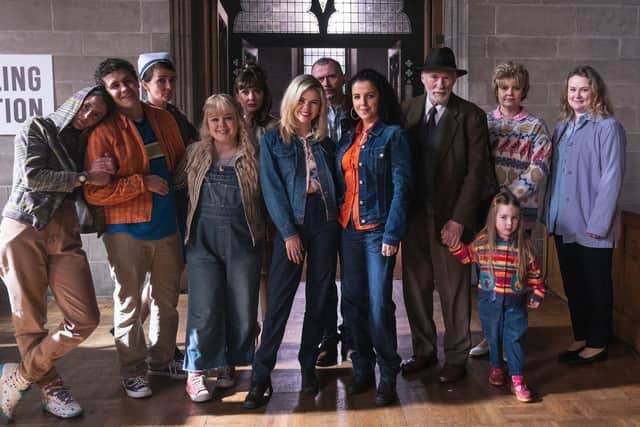Derry Girls' finale could not be more significant as Tories play with peace in Northern Ireland - Dani Garavelli
Granda Joe and the littlest DG leaving the polling station hand-in-hand - shadows behind them, a pool of light in front - was gorgeous in its own right. But it was their wee jump-skips that raised it to another level. The symbolism was clear and powerful: on May 22, 1998, the young and old of Northern Ireland took a jump-skip of faith into a better future.
The whole episode was pitch-perfect: profound and enlightening, but done with such a deft touch it never felt preachy. The complex history of the Troubles was underscored by the hilarious inanity of Jenny's play, the effort to get to grips with the terms of the Good Friday Agreement by Granda Joe’s Tayto-aided 90s’ version of a PowerPoint presentation.


Advertisement
Hide AdAdvertisement
Hide AdAnd then, finally: the scene in the polling station, the camera lingering over the faces of the characters as they prepared to cast their vote. The acting was superb, each face reflecting the decades of pain that led up to that defining moment; each face expressing how much it meant - but also how much it cost - to put their cross in the Yes box.
What the episode didn’t fully capture, perhaps (because it’s a comedy series, not a documentary) is that the referendum - while a watershed - was neither the beginning nor the end of the process; and that peace could not be delivered by popular will alone.
There were still several years of knife-edge negotiations to come as Sinn Féin leader Gerry Adams and Ulster Unionist leader David Trimble struggled to keep hardliners on board. There would be further atrocities - the murder of the Quinn brothers (July 98), the bombing of Omagh (August 98) and the murder of lawyer Rosemary Nelson (March 99) - before the bloodletting abated and the assembly was up and running.
Like many families, I’m sure, I watched the Derry Girls finale with my youngest son. One of the dividends of the accord is - as Granda Joe predicted - that the Troubles have become “a ghost story we tell our weans - one [they] hardly believe”. The generation now reaching adulthood has not been touched by the conflict, or grown up with the images of bombings as the backdrop to their daily lives.
This is something to be celebrated; the whole point of the exercise. But it is important, I think, for them to properly, viscerally understand the bloody toll, and how much grinding labour it took on the part of individuals and politicians, inside and outside the country, to end it. Otherwise how can they appreciate what is at risk now, or how recklessly our current UK leaders are gambling with their predecessors’ hard-earned legacy?
The timing of the Derry Girls finale could not be more significant. For the last few years, the Tory government has been playing pitch and toss with peace in the name of Brexit. They knew a hard border between Northern Ireland and the Republic was against the spirit of the Good Friday Agreement. They knew a de facto border in the Irish Sea would anger unionists determined the country should be treated like the rest of the UK (although this - the Northern Ireland protocol - was the deal eventually struck). They forged ahead regardless, staking everything on a tinpot prize of so-called sovereignty.
Those “Chuckle Brothers” days when the DUP’s Ian Paisley and Sinn Féin’s Martin McGuinnes served congenially as First Minister and Deputy First Minister are long gone. With Sinn Féin now the biggest party in the north and south, and a renewed focus on the reunification of Ireland, the self-sabotaging DUP, which secretly funneled hundreds of thousands of pounds into the Leave campaign, is blocking the restoration of a power-sharing administration at Stormont unless the UK unilaterally breaks the protocol. And Boris Johnson - who knew and ignored the potential ramifications of Brexit - seems eager to please, threatening to override the EU agreement.
This despite the fact most politicians within the assembly do not want the protocol over-ridden. The EU has already warned, if Johnson pursues this course, it could suspend its post-Brexit trade agreement with Britain, sparking a trade war. So serious is the situation that Joe Biden has intervened to warn Johnson against acting unilaterally.
Advertisement
Hide AdAdvertisement
Hide AdThe last president to play a major role in promoting stability in Northern Ireland was Bill Clinton. He toured the country in late 1995 with Hillary, making a powerful plea for peace and praising those who were working towards a settlement.
Those he praised included then Tory Prime Minister John Major. Later, Democrat Senator George Mitchell would work with Labour Prime Minister Tony Blair and Northern Ireland Secretary Mo Mowlam (along with Adams, Trimble, John Hume and others) to create the Good Friday Agreement. There were endless, head-bashing frustrations, but always the sense everyone was working towards a common goal: an end to violence.
The comedy series, which ended with Chelsea finally receiving a letter the teenagers had sent on the eve of the 1995 visit, reminded us of a time when walls and borders were coming down, not going up, politicians had a vision beyond feathering their own nests, and compromise was not seen as a sign of weakness.
At the same time, it brought home to viewers the cynicism of politics today, the threat to an accord 71.7 per cent of the population endorsed, and the machinations pushing Northern Ireland towards a past it believed it had left behind.
That is why Derry Girls hurt so much. And why its message must not be ignored.
Comments
Want to join the conversation? Please or to comment on this article.
